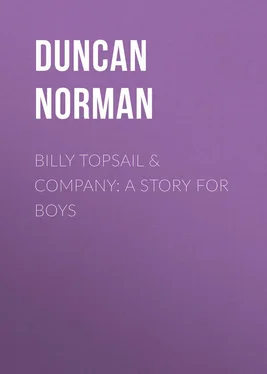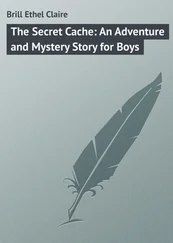Norman Duncan - Billy Topsail & Company - A Story for Boys
Здесь есть возможность читать онлайн «Norman Duncan - Billy Topsail & Company - A Story for Boys» — ознакомительный отрывок электронной книги совершенно бесплатно, а после прочтения отрывка купить полную версию. В некоторых случаях можно слушать аудио, скачать через торрент в формате fb2 и присутствует краткое содержание. Жанр: foreign_antique, foreign_prose, на английском языке. Описание произведения, (предисловие) а так же отзывы посетителей доступны на портале библиотеки ЛибКат.
- Название:Billy Topsail & Company: A Story for Boys
- Автор:
- Жанр:
- Год:неизвестен
- ISBN:нет данных
- Рейтинг книги:4 / 5. Голосов: 1
-
Избранное:Добавить в избранное
- Отзывы:
-
Ваша оценка:
- 80
- 1
- 2
- 3
- 4
- 5
Billy Topsail & Company: A Story for Boys: краткое содержание, описание и аннотация
Предлагаем к чтению аннотацию, описание, краткое содержание или предисловие (зависит от того, что написал сам автор книги «Billy Topsail & Company: A Story for Boys»). Если вы не нашли необходимую информацию о книге — напишите в комментариях, мы постараемся отыскать её.
Billy Topsail & Company: A Story for Boys — читать онлайн ознакомительный отрывок
Ниже представлен текст книги, разбитый по страницам. Система сохранения места последней прочитанной страницы, позволяет с удобством читать онлайн бесплатно книгу «Billy Topsail & Company: A Story for Boys», без необходимости каждый раз заново искать на чём Вы остановились. Поставьте закладку, и сможете в любой момент перейти на страницу, на которой закончили чтение.
Интервал:
Закладка:
Norman Duncan
Billy Topsail & Company: A Story for Boys
CHAPTER I
In Which Jimmie Grimm, Not Being Able to Help It, Is Born At Buccaneer Cove, Much to His Surprise, and Tog, the Wolf-Dog, Feels the Lash of a Seal-hide Whip and Conceives an Enmity
Young Jimmie Grimm began life at Buccaneer Cove of the Labrador. It was a poor place to begin, of course; but Jimmie had had nothing to do with that. It was by Tog, with the eager help of two hungry gray wolves, that he was taught to take care of the life into which, much to his surprise, he had been ushered. Tog was a dog with a bad name; and everybody knows that a dog with a bad name should be hanged forthwith. It should have happened to Tog. At best he was a wolfish beast. His father was a wolf; and in the end Tog was as lean and savage and cunningly treacherous as any wolf of the gray forest packs. When he had done with Jimmie Grimm–and when Jimmie Grimm’s father had done with Tog–Jimmie Grimm had learned a lesson that he never could recall without a gasp and a quick little shudder.
“I jus’ don’t like t’ think o’ Tog,” he told Billy Topsail and Archie Armstrong, long afterwards.
“You weren’t afraid of him, were you?” Archie Armstrong demanded, a bit scornfully.
“ Was I?” Jimmie snorted. “Huh!”
The business with Tog happened before old Jim Grimm moved south to Ruddy Cove of the Newfoundland coast, disgusted with the fishing of Buccaneer. It was before Jimmie Grimm had fallen in with Billy Topsail and Donald North, before he had ever clapped eyes on Bagg, the London gutter-snipe, or had bashfully pawed the gloved hand of Archie Armstrong, Sir Archibald’s son. It was before Donald North cured himself of fear and the First Venture had broken into a blaze in a gale of wind off the Chunks. It was before Billy Topsail, a lad of wits, had held a candle over the powder barrel, when the wreckers boarded the Spot Cash . It was before Bill o’ Burnt Bay had been rescued from a Miquelon jail and the Heavenly Home was cut out of St. Pierre Harbour in the foggy night.
It was also before the Spot Cash had fallen foul of the plot to scuttle the Black Eagle . It was before the big gale and all the adventures of that northward trading voyage. In short, it was before Jim Grimm moved up from the Labrador to Ruddy Cove for better fishing.
Tog had a bad name. On the Labrador coast all dogs have bad names; nor, if the truth must be told, does the reputation do them any injustice. If evil communications corrupt good manners, the desperate character of Tog’s deeds, no less than the tragic manner of his end, may be accounted for. At any rate, long before his abrupt departure from the wilderness trails and snow-covered rock of Buccaneer Cove, he had earned the worst reputation of all the pack.
It began in the beginning. When Tog was eight weeks old his end was foreseen. He was then little more than a soft, fluffy, black-and-white ball, awkwardly perambulating on four absurdly bowed legs. Martha, Jim Grimm’s wife, one day cast the lean scraps of the midday meal to the pack. What came to pass so amazed old Jim Grimm that he dropped his splitting-knife and stared agape.
“An’ would you look at that little beast!” he gasped. “That one’s a wonder for badness!”
The snarling, scrambling heap of dogs, apparently inextricably entangled, had all at once been reduced to order. Instead of a confusion of taut legs and teeth and bristling hair, there was a precise half-circle of gaunt beasts, squatted at a respectful distance from Tog’s mother, hopelessly licking their chops, while, with hair on end and fangs exposed and dripping, she kept them off.
“It ain’t Jinny,” Jim remarked. “You can’t blame she. It’s that little pup with the black eye.”
You couldn’t blame Jenny. Last of all would it occur to Martha Grimm, with a child of her own to rear, to call her in the wrong. With a litter of five hearty pups to provide for, Jenny was animated by a holy maternal instinct. But Tog, which was the one with the black eye, was not to be justified. He was imitating his mother’s tactics with diabolical success. A half-circle of whimpering puppies, keeping a respectful distance, watched in grieved surprise, while, with hair on end and tiny fangs occasionally exposed, he devoured the scraps of the midday meal.
“A wonder for badness!” Jim Grimm repeated.
“‘Give a dog a bad name,’” quoted Martha, quick, like the woman she was, to resent snap-judgment of the young, “‘an’–’”
“‘Hang un,’” Jim concluded. “Well,” he added, “I wouldn’t be s’prised if it did come t’ that.”
It did.
In Tog’s eyes there was never the light of love and humour–no amiable jollity. He would come fawning, industriously wagging his hinder parts, like puppies of more favoured degree; but all the while his black eyes were alert, hard, infinitely suspicious and avaricious. Not once, I am sure, did affection or gratitude lend them beauty. A beautiful pup he was, nevertheless–fat and white, awkwardly big, his body promising splendid strength. Even when he made war on the fleas–and he waged it unceasingly–the vigour and skill of attack, the originality of method, gave him a certain distinction. But his eyes were never well disposed; the pup was neither trustful nor to be trusted.
“If he lives t’ the age o’ three,” said Jim Grimm, with a pessimistic wag of the head, “’twill be more by luck than good conduct.”
“Ah, dad,” said Jimmie Grimm, “you jus’ leave un t’ me!”
“Well, Jimmie,” drawled Jim Grimm, “it might teach you more about dogs than you know. I don’t mind if I do leave un t’ you–for a while.”
“Hut!” Jimmie boasted. “ I’ll master un.”
“May be ,” said Jim Grimm.
It was Jimmie Grimm who first put Tog in the traces. This was in the early days of Tog’s first winter–and of Jimmie’s seventh. The dog was a lusty youngster then; better nourished than the other dogs of Jim Grimm’s pack, no more because of greater strength and daring than a marvellous versatility in thievery. In a bored sort of way, being at the moment lazy with food stolen from Sam Butt’s stage, Tog submitted. He yawned, stretched his long legs, and gave inopportune attention to a persistent flea near the small of his back. When, however, the butt of Jimmie’s whip fell smartly on his flank, he was surprised into an appreciation of the fact that a serious attempt was being made to curtail his freedom; and he was at once alive with resentful protest.
“Hi, Tog!” Jimmie complained. “Bide still!”
Tog slipped from Jimmie’s grasp and bounded off. He turned with a snarl.
“Here, Tog!” cried Jimmie.
Tog came–stepping warily over the snow. His head was low, his king-hairs bristling, his upper lip lifted.
“Ha, Tog, b’y!” said Jimmie, ingratiatingly.
Tog thawed into limp and servile amiability. The long, wiry white hair of his neck fell flat; he wagged his bushy white tail; he pawed the snow and playfully tossed his long, pointed nose as he crept near. But had Jimmie Grimm been more observant, more knowing, he would have perceived that the light in the lanky pup’s eyes had not mellowed.
“Good dog!” crooned Jimmie, stretching out an affectionate hand.
Vanished, then, in a flash, every symptom of Tog’s righteousness. His long teeth closed on Jimmie’s small hand with a snap. Jimmie struck instantly–and struck hard. The butt of the whip caught Tog on the nose. He dropped the hand and leaped away with a yelp.
“Now, me b’y,” thought Jimmie Grimm, staring into the quivering dog’s eyes, not daring to glance at his own dripping hand, “I’ll master you !”
Читать дальшеИнтервал:
Закладка:
Похожие книги на «Billy Topsail & Company: A Story for Boys»
Представляем Вашему вниманию похожие книги на «Billy Topsail & Company: A Story for Boys» списком для выбора. Мы отобрали схожую по названию и смыслу литературу в надежде предоставить читателям больше вариантов отыскать новые, интересные, ещё непрочитанные произведения.
Обсуждение, отзывы о книге «Billy Topsail & Company: A Story for Boys» и просто собственные мнения читателей. Оставьте ваши комментарии, напишите, что Вы думаете о произведении, его смысле или главных героях. Укажите что конкретно понравилось, а что нет, и почему Вы так считаете.












